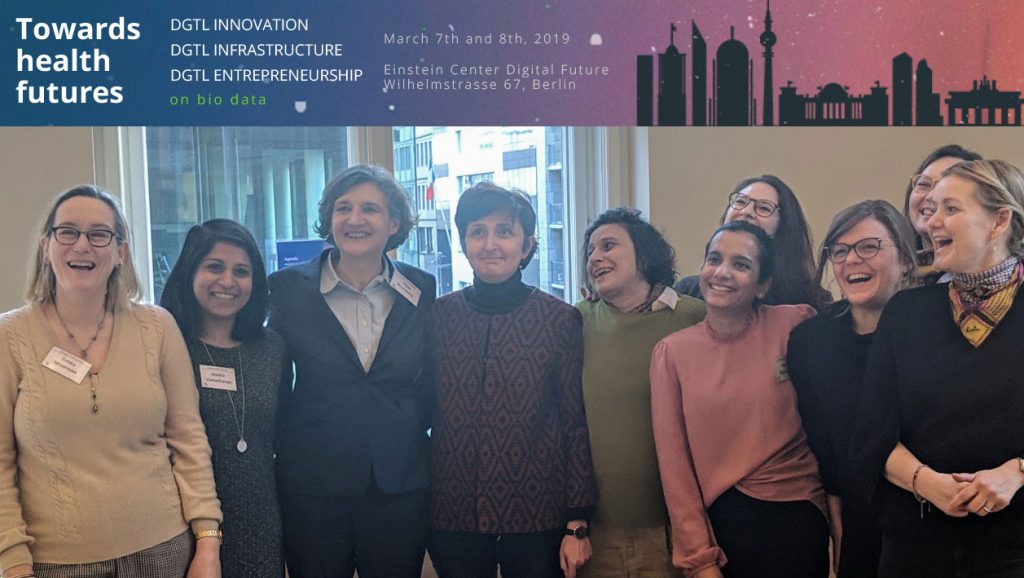
On March 7th and 8th, 2019, the first “Towards Health Futures” conference about innovation, entrepreneurship, and infrastructure on bio data has been held in Berlin. Sirkka Jarvenpaa (University of Texas at Austin), Michael Barrett (University of Cambridge), and Hannes Rothe (Freie Universität Berlin) invited 35 experts to Berlin to set the first stepping stone for an international community seeking that reflects the phenomenon of bio data.
Day 1: Seeking convergence on bio data among academics
The first day focused on setting a trajectory for upcoming academic discussions and projects between the fields of management, information systems, computer science, and life science. Due to the multitude of disciplines and professions at each table, professor Brian Pentland has set the frame for this community from the very start: convergence.
Following the lead of professors Panos Constantinides (Warwick Business School), Martin Gersch (Freie Universität Berlin) as well as Katharina Lauer (ELIXIR), the participants gave insights into their current projects;
Biodata Entrepreneurship: Prospects, ecosystem and business model innovations
by L. Ricard
Proteomics as a service
by M. Shraideh and H. Krcmar
The digitization of the individual process: designing for the emergence of the digital practice
by L. Wessel et al.
Infrastructuring Governance – Control Re-distribution in Entrepreneurial Biodata-Exchange Initiatives
by A. Essen
How do entrepreneurial firms appropriate value in open bio data infrastructures: an exploratory qualitative study
by H. Rothe et al.
Analyzing Direct-to-Consumer Genomics Services’ Business Models
by S. Thiebes et al.
Welfare Technology – Digital Transformation and Platform Ecosystems in Healthcare
by S. Hochwarter
Designing Data Infrastructures for Epistemic Uncertainty: The Case of Medical Genetic Initiatives
by. S. Jarvenpaa & L. Markus
The unlikely cooperation: Open Targets platform
by L. Pujol et al.
Distributed Ledger Technology for Life Science: A Design Science Research Project
by T. Dehling et al.
Interoperability in digital health start-ups
by L. Stegemann
High-definition risk profiling in digital infrastructures for perioperative care
by D. Fürstenau et al.
Strengthening AMR surveillance within a One Health framework
by Sahay et al.
Microfounding the Data Pooling Problem: A Club Theoretical Perspective
by M. Minervini
Sharing of Personal Genome Data: Towards a Social Privacy Calculus
by S. Thiebes et al.
Data as a boundary resource: intent and impact of third party forking from bio data platforms
by A. Penninger
Understanding the conjunction between “the byte” and “the gene”: an infrastructural perspective on bio data
by P. Vassilakopoulou
Giving life to data via sustainable data platforms, GDPR tools and hosting service
by V. Satagopam et al.
Data Governance – Elaborating on a Research Concept
by M. von Grafenstein et al.
Day 2: Seeking convergence on bio data with start-ups and industry
On the second day, Jason Mellad (Start Codon) shared his view as a founder of a bio tech accelerator in Cambridge (UK) as well as former CEO of a succesful biodata startup on current trends and presented his design of a bio data-focused ecosystem design.
His view was complemented by two founders of bio data start-ups who presented some of the most urging issues for their companies. Marco Schmidt presented his solution for developing digital biomarkers with biotx. In contrast, Joachim Wunderlich showcased tycheheart, a company that offers a digital solution for managing heart failures.
Finally, Adrian Freeman (Associate Director of Emerging Innovations Unit AstraZeneca) invited the participants to discuss opportunities and tackle challenges associated to open data and open innovation in a pharma company.




Following the intensive workshop format on market challenges, three key notes initiated a discussion on environmental factors including policy, regulation, and standard setting on entrepreneurship and innovation with biodata.
Jessica Vamathevan (Head of Strategic Partnership Office at EMBL-EBI) shared the current state of genome data collection and standard setting. Following an insightful view on value chains in biotech, Viola Bronsema (CEO of BIO Deutschland) has shed light on the relationship between policy and biotech.
Finally, professor Klaus Høyer (University of Copenhagen) reflected on the political, economic, and academic discourse that involve technological developments.
We thank all the participants and supporters of the conference, particularly the Center for International Cooperation at Freie Universität Berlin and Einstein Center Digital Future Berlin.







This post is also available in: Englisch

Eine Einrichtung der
